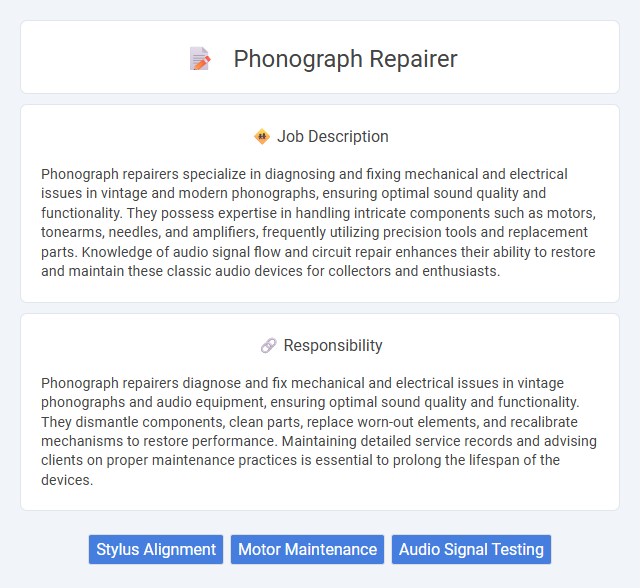
Phonograph repairers specialize in diagnosing and fixing mechanical and electrical issues in vintage and modern phonographs, ensuring optimal sound quality and functionality. They possess expertise in handling intricate components such as motors, tonearms, needles, and amplifiers, frequently utilizing precision tools and replacement parts. Knowledge of audio signal flow and circuit repair enhances their ability to restore and maintain these classic audio devices for collectors and enthusiasts.
Individuals with strong mechanical aptitude and attention to detail are likely well-suited for a Phonograph Repairer role, given the precise nature of restoring delicate vintage equipment. Candidates who prefer hands-on, technical work and have patience for intricate tasks may find this job compatible with their skills and interests. Those who struggle with fine motor skills or lack interest in historical audio technology might not find this career fulfilling or suitable.
Qualification
Phonograph repairers require a strong background in electronics, mechanics, and sound equipment calibration to diagnose and fix issues in vintage and modern phonographs. Proficiency in soldering, circuit board analysis, and familiarity with analog audio technology are essential skills. Candidates typically need hands-on experience with audio devices and a technical certification or degree in electronics or a related field.
Responsibility
Phonograph repairers diagnose and fix mechanical and electrical issues in vintage phonographs and audio equipment, ensuring optimal sound quality and functionality. They dismantle components, clean parts, replace worn-out elements, and recalibrate mechanisms to restore performance. Maintaining detailed service records and advising clients on proper maintenance practices is essential to prolong the lifespan of the devices.
Benefit
Phonograph repairers likely experience the benefit of preserving vintage audio technology, which could attract enthusiasts and collectors seeking high-quality service. Their specialized skills may increase demand, potentially leading to stable income and job security within niche markets. Opportunities to work with diverse phonograph models might also enhance expertise and professional growth.
Challenge
Phonograph repairers likely face challenges related to the intricate and delicate nature of antique devices, requiring precise skills and steady hands. The rarity of replacement parts may pose difficulties in restoring functionality, increasing the complexity of each repair. Adapting to a wide variety of phonograph models could require continuous learning and problem-solving under uncertain conditions.
Career Advancement
Phonograph repairers develop specialized skills in restoring and maintaining vintage audio equipment, creating a niche expertise valuable in antique restoration and audio preservation industries. Mastery in circuit diagnostics, component replacement, and historical knowledge of phonograph models opens opportunities for advancement to supervisory roles or technical consultancy. Continuous learning and certification in electronics repair enhance career growth, allowing transition into broader audio equipment restoration or museum curation positions.
Key Terms
Stylus Alignment
Stylus alignment is a critical task for a phonograph repairer, ensuring optimal sound quality and cartridge performance. Precise adjustment of the stylus involves calibrating its angle and tracking force to minimize record wear and distortion. Mastery in this skill directly enhances the audio fidelity and longevity of vinyl playback systems.
Motor Maintenance
Phonograph repairers specializing in motor maintenance ensure the smooth operation of the device by inspecting, lubricating, and replacing worn or damaged motor components. They diagnose motor performance issues using technical tools to maintain optimal rotational speed and reduce noise or vibration. Expertise in repairing synchronous and DC motors is crucial for restoring phonograph functionality and sound quality.
Audio Signal Testing
Audio signal testing in phonograph repair ensures precise diagnostics by analyzing frequency response, distortion levels, and signal integrity using specialized oscilloscopes and audio analyzers. Experts calibrate playback components to restore optimal sound quality, addressing issues like signal dropouts and noise interference. Advanced testing techniques enhance the accuracy of repairs, extending the lifespan of vintage and modern phonographs.
 kuljobs.com
kuljobs.com